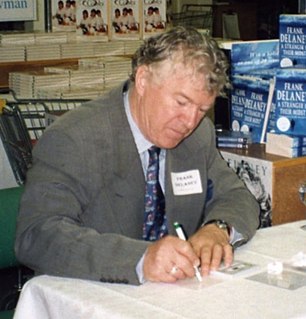A Quote by Tom Robbins
The human race has always defined itself through narration. That isn't going to change just because we've gone electronic. What is changing is that now we're allowing corporations to tell our stories for us.
Related Quotes
If the human race develops an electronic nervous system, outside the bodies of individual people, thus giving us all one mind and one global body, this is almost precisely what has happened in the organization of cells which compose our own bodies. We have already done it. [...] If all this ends with the human race leaving no more trace of itself in the universe than a system of electronic patterns, why should that trouble us? For that is exactly what we are now!
What does it matter, if we tell the same old stories? ...Stories tell us who we are. What we’re capable of. When we go out looking for stories we are, I think, in many ways going in search of ourselves, trying to find understanding of our lives, and the people around us. Stories, and language tell us what’s important.
Each of us is comprised of stories, stories not only about ourselves but stories about ancestors we never knew and people we've never met. We have stories we love to tell and stories we have never told anyone. The extent to which others know us is determined by the stories we choose to share. We extend a deep trust to someone when we say, "I'm going to tell you something I've never told anyone." Sharing stories creates trust because through stories we come to a recognition of how much we have in common.
The very act of story-telling, of arranging memory and invention according to the structure of the narrative, is by definition holy. We tell stories because we can't help it. We tell stories because we love to entertain and hope to edify. We tell stories because they fill the silence death imposes. We tell stories because they save us.
The one joy that has kept me going through life has been the fact that stories unite us. To see you as you listen to me now, as you have always listened to me, is to know this: what I can believe, you can believe. And the way we all see our story-not just as Irish people but as flesh and blood individuals and not the way people tell us to see it-that's what we own, no matter who we are and where we come from.
In the most basic way, writers are defined not by the stories they tell, or their politics, or their gender, or their race, but by the words they use. Writing begins with language, and it is in that initial choosing, as one sifts through the wayward lushness of our wonderful mongrel English, that choice of vocabulary and grammar and tone, the selection on the palette, that determines who's sitting at that desk. Language creates the writer's attitude toward the particular story he's decided to tell.
Here ends the story of a ship, but there will always be other ships, for we are an island race. Through all our centuries, the sea has ruled our destiny. There will always be other ships and men to sail in them. It is these men, in peace or war, to whom we owe so much. Above all victories, beyond all loss, in spite of changing values in a changing world, they give to us, their countrymen, eternal and indomitable pride.






































